Quantum Computing and AI: What Happens When These Technologies Combine?
November 10, 2024

Quantum computing is no longer just a theoretical concept; it is fast becoming a transformative technology that could potentially revolutionize a wide range of fields. When combined with artificial intelligence (AI), quantum computing offers extraordinary possibilities that could surpass any computational power we currently have.
In this article, we explore what quantum computing and artificial intelligence are, how they work, and what happens when these two groundbreaking technologies converge.
1. Understanding Quantum Computing
Quantum computing is based on the principles of quantum mechanics, which govern the behavior of particles at the atomic and subatomic levels. In contrast to classical computers that use bits (0s and 1s), quantum computers utilize quantum bits or qubits. Qubits can exist in multiple states at once, thanks to a phenomenon called superposition. This allows quantum computers to perform many calculations simultaneously.
Moreover, qubits can be entangled, meaning the state of one qubit can depend on the state of another, no matter the distance between them. This feature can dramatically increase computing power, enabling quantum computers to solve complex problems that are practically impossible for classical computers.
2. A Brief Overview of Artificial Intelligence
Artificial intelligence refers to the simulation of human intelligence in machines that are programmed to think and learn. AI is broadly categorized into two types: narrow AI and general AI. Narrow AI specializes in one area, such as facial recognition or language translation, while general AI denotes a machine that possesses human-like cognitive abilities across a variety of tasks.
Over the years, AI has made significant strides, particularly through advancements in machine learning (ML) and deep learning (DL), which allow computers to analyze vast datasets, recognize patterns, and improve their performance over time.
3. The Intersection of Quantum Computing and AI
With the rise of quantum computing, the potential to enhance AI capabilities is more promising than ever. Here’s a closer look at what happens when these technologies interlace:
3.1 Improved Data Processing and Analysis
One of the primary advantages of quantum computing is its unparalleled speed in processing data. AI algorithms often require significant computational resources, especially in training models on large datasets. Quantum computing can significantly expedite this process by handling multiple calculations at once. This enables AI to become smarter, faster, and more efficient.
3.2 Enhanced Machine Learning Models
Machine learning models can be optimized using quantum computing. By leveraging quantum algorithms, such as the Quantum Support Vector Machine or the Quantum Neural Network, AI can refine its predictions with greater accuracy and fewer resources. This groundbreaking approach can transform industries such as finance, healthcare, and logistics, where timely and data-driven decisions are critical.
3.3 tackling Complex Problems
Many real-world problems involve complex systems with numerous variables interacting in intricate ways—these are often referred to as NP-hard problems. Quantum computing can potentially address these challenges more effectively than classical computing alone. When combined with AI, we can tackle issues like climate modeling, drug discovery, and optimization problems in supply chain management.
4. Real-World Applications of Quantum AI
Various sectors are already exploring innovative ways to implement the synergy of quantum computing and AI. Here are some notable applications:
4.1 Healthcare
In healthcare, the combination of AI and quantum computing can lead to groundbreaking advancements in drug discovery. AI algorithms can analyze vast quantities of biological data and generate insights into possible treatments. Quantum computing can then evaluate these complex biochemical interactions at an extraordinary speed, accelerating the drug development process, potentially saving lives.
4.2 Cybersecurity
Cybersecurity is becoming increasingly significant due to the rise of digital threats. Quantum computing can provide enhanced security measures through quantum encryption techniques. AI can help in analyzing patterns of cyber threats, allowing organizations to preemptively safeguard their systems.
4.3 Financial Services
The financial industry can leverage quantum AI for better risk assessment, fraud detection, and algorithmic trading. With the ability to process massive datasets in real-time, quantum AI can make sophisticated predictions and strategies that outperform traditional models.
5. Challenges and Considerations
While the potential benefits of combining quantum computing and AI are remarkable, several challenges must be addressed:
5.1 Technical Complexities
Quantum computing is still in its nascent stage, with significant technical hurdles to navigate. Researchers are exploring scalable quantum computers, error-correction methods, and efficient quantum algorithms—progress in these areas is essential for realizing the full potential of quantum AI.
5.2 Ethical Implications
The convergence of AI and quantum computing raises ethical concerns, particularly regarding surveillance, privacy, and bias. It’s crucial to establish ethical guidelines and frameworks to ensure responsible deployment and to mitigate potential harm.
Conclusion
The combination of quantum computing and AI presents a future filled with opportunities and challenges. While the advantages of enhanced processing power and improved machine learning capabilities are evident, hurdles remain regarding technical, ethical, and societal implications. The interplay between these technologies could redefine our world, leading us into a new era of computing and intelligence.
As we move forward, fostering collaboration between scientists, ethicists, and technologists will ensure that the development of quantum AI proceeds in a manner that is beneficial for humanity. If harnessed responsibly, the synergy of quantum computing and AI could pave the way for innovations that solve some of our most pressing challenges.






